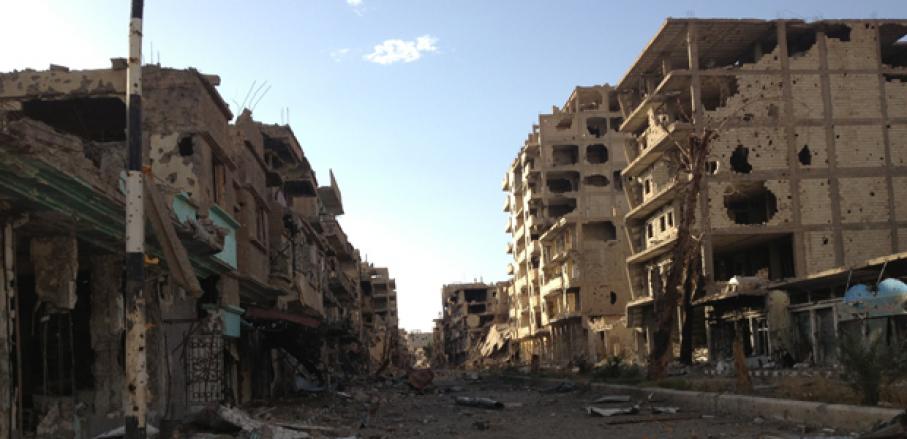PHOTO: Deir ez-Zor, Syria’s 7th-largest city (File)
LATEST
- Renewed Pro-Assad Assault on Wadi Barada
- SNHR: Almost 13,000 Barrel Bombs in 2016, Killing 653
- Regime’s Lead Negotiator Over Wadi Barada Killed — But Who Did It?
The Islamic State launched a series of attacks on regime forces in Deir ez-Zor city in eastern Syria on Saturday, reportredly causing dozens of casualties.
Activists claimed at least six large explosions in the city, Syria’s seventh-largest, bordering Iraq and about 450 km (280 mi) northeast of Damascus. State media acknowledged the attacks, but claimed that the Syrian army was repelling the assault, including around the military airport. The SANA news agency said three people were killed and nine wounded by shelling on residential districts.
The Islamic State controls most of Deir al-Zor Province and more than half of the city. It has launched periodic attacks over the past two years and besieged the remaining districts. The regime’s position has been sustained by regular Russian and regime airdrops to about 200,000 people.
ISIS has been pushed back in much of its territory by a combination of Kurdish-led and Turkish-rebel offensives in northern Syria. However, it struck back in December, recapturing the ancient city of Palmyra in central Syria from the regime. It still controls the city of Raqqa, and it is holding onto its main position in Aleppo Province, the town of al-Bab, despite a six-week Turkish-rebel offensive.
Renewed Pro-Assad Assault on Wadi Barada
Local activists report a renewed pro-Assad assault as Hezbollah and regime forces try to overrun the Wadi Barada area, northwest of Damascus.
The activists describe “heavy clashes” between regime forces and rebels with medium and heavy machine guns on multiple axes of attacks. They say the assaults have been repelled so far.
The offensive, in its fourth week and breaking the December 29 ceasefire, has made limited gains so far despite bombing, shelling, fire into the valley, and the ground attacks — on Friday, Hezbollah finally took the village of Bassima on the southern edge after leveling much of it.
There have been talks for a possible truce; however, on Saturday the regime’s head of negotiations was killed, either by rebels or by a Hezbollah sniper (see earlier entry).
Images of pro-Assad forces:
Activists say at least 10 civilians have been killed in Deir Qanoun village, posting video of some of the shrouded bodies and blood-stained floors (Warning — Graphic Images):
SNHR: Almost 13,000 Barrel Bombs in 2016, Killing 653
The Syrian Network for Human Rights, which documents casualties and attacks in Syria’s conflict, reports that regime helicopters dropped 12,958 barrel bombs in 2016.
The attacks killed 653 civilians, including 166 children and 86 women. Almost 100 structures were damaged, including refugee camps, mosques, schools, and 28 medical facilities.
The report also details 1,373 attacks on civilian infrastructure in 2016: 761 by the regime military, 437 by Russian forces, 55 by rebels, 33 by the Islamic State, and 43 by the US-led coalition.
At least 1373 attacks on Civilian Vital Facilities by the main influential parties in 2016https://t.co/osqRrxIHmj#Syria pic.twitter.com/YA2tu2jJDO
— Syrian Network (@snhr) January 10, 2017
Regime’s Lead Negotiator Over Wadi Barada Killed — But Who Did It?
The Assad regime’s chief negotiator over the conflict in Wada Barada, Ahmad Ghadban, has been killed.
Ghadban’s cause of death is unclear. His family have said that he may been targeted by rebels; however, they also say he may been shot by a Hezbollah sniper.
Asserting that Hezbollah killed Ghadban, a spokesman for the Wadi Barada Media Center, Abu Mohammad al-Baradawi, said, “His loss in indescribable. He wasn’t just a member of the negotiating committee, he was a son of [the village of] Ain al-Fijeh. He was the biggest personality in all of Wadi Barada.”
Journalist Nour Samaha, citing “locals in the area”, says Ghadban was shot and killed by a man from Wadi Barada. The assailant allegedly was working for a Jordanian emir of the jihadists of Jabhat Fatah al-Sham. The sources say the provincial Governor may have been the intended targets, but was in an armored SUV.
Samaha claims the gunman was arrested.
On Friday, al-Ghadban brpkered a political solution for an immediate ceasefire and access for engineers to repair the infrastructure for the al-Fija springs, damaged by regime airstrikes. The springs provide more than 60% of Damascus’s water, and their cut-off has limited supplies for more than 5 million people.
Friday’s accord also set out terms for a rebel departure from Wadi Barada.
However, within hours, the deal broke down with multiple reports of shelling and gunfire targeting the repair teams. Engineers were unable to fix the Ein al-Fijeh pumping station over the weekend.
Hezbollah and regime forces launched an offensive on December 22 to overrun Wadi Barada’s 10 villages, with between 50,000 and 100,000 people. The bombing, shelling, and ground attacks have continued despite a supposed December 29 ceasefire, with President Assad pledging to remove all “terrorists” from the area.

